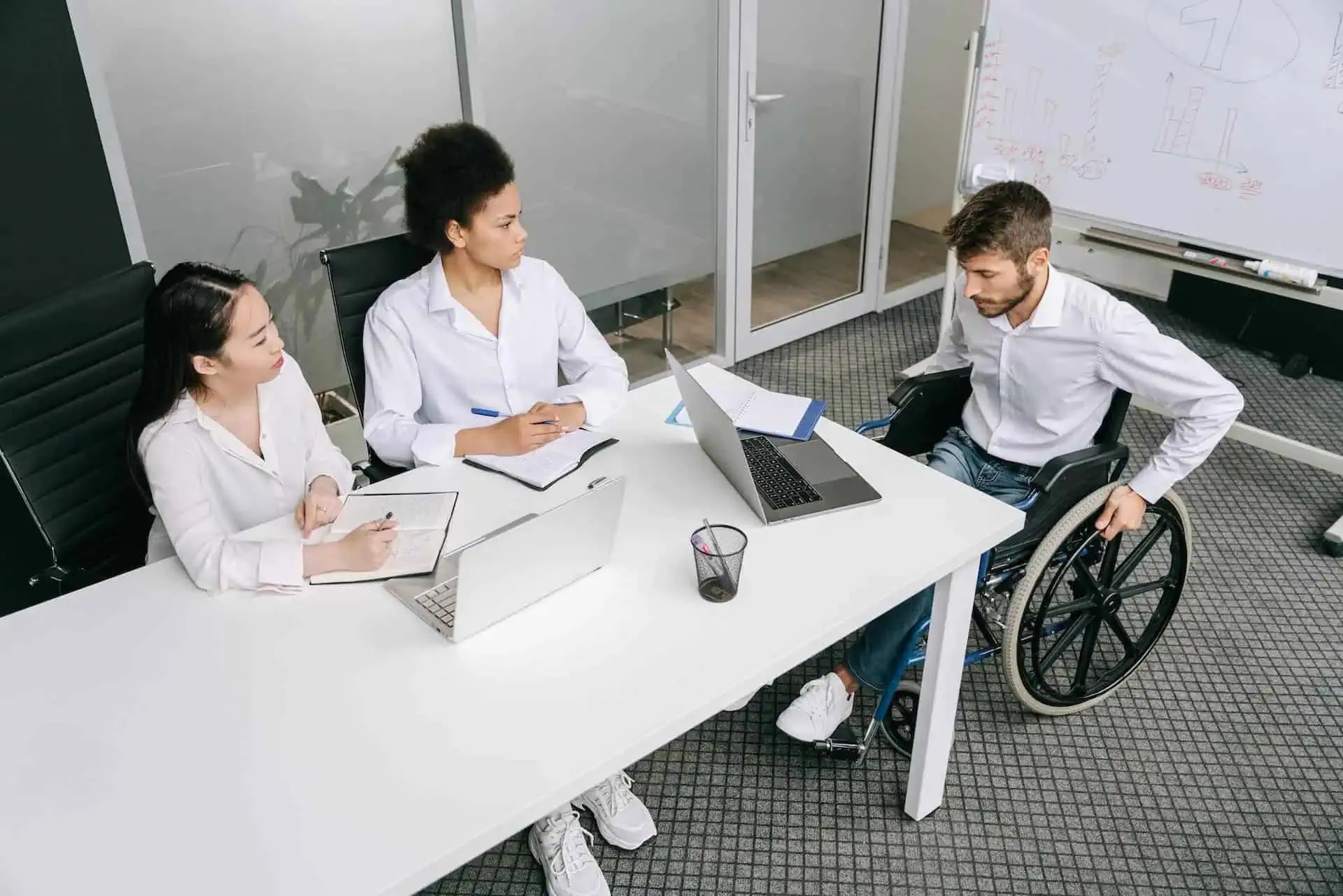Starting your job search can feel overwhelming, particularly when you’re navigating the process with a disability. But here’s the good news: being informed about your disability interview rights awareness levels the playing field. This guide is crafted to empower you, shedding light on your rights, the accommodations you’re entitled to, and how to confidently approach interviews. Whether you’re seeking your first job or aiming to move into a more inclusive workplace, understanding your rights and how to assert them is critical.
So, let’s dive in. Together, we’ll explore how you can fully prepare for your job interview, showcase your abilities, and advance in your career, all while raising awareness about disability rights in the workplace.
Understanding Disability Interview Rights Awareness
Finding the right job is a big step for everyone, especially those with disabilities. First off, it’s vital to have a clear understanding of disability interview rights awareness. This knowledge empowers you and ensures you’re treated relatively during the interview process.
Under the Americans with Disabilities Act (ADA), discrimination against persons with disabilities in job interviews is illegal. This means you’re entitled to reasonable accommodations that help you participate fully in the interview process.
The Americans with Disabilities Act (ADA)
The ADA plays a crucial role in protecting your rights. Here’s what it does:
- Prohibits job discrimination based on disability.
- Guarantees reasonable accommodations unless they cause undue hardship for the employer.
- Ensures equal opportunities in job application procedures, hiring, and employee advancement.
For more tips on the interview process for remote jobs, which can also apply to individuals with disabilities, check out Applying for Remote Jobs: Working Successfully from Anywhere in the World, which includes guidelines on ADA compliance.
Understanding your rights is the first step to a successful job interview. Knowing what accommodations you can request and expect during the interview empowers you to focus on showcasing your abilities. After all, your skills and experience are what define your potential!
Deciding to Disclose Your Disability
When prepping for an interview, you might wonder if you should tell your potential employer about your disability. This is a big decision. Here’s what to consider:
Your Comfort and Needs
Think about your comfort level and needs first. Not every disability needs to be shared, significantly if it doesn’t affect your job performance. But, if you require accommodations, you must share some information.
The Right Time
Timing is important. Some people choose to discuss their disability in their application or cover letter, especially if explaining disability accommodations needed for a job interview. Others wait until after they’ve received a job offer. There’s no one correct answer. Do what feels best for you.
Remember, the goal of the interview is to focus on your skills and how well you fit the job. Your disability doesn’t define your capabilities. Being open about what you need to succeed shows you’re proactive and prepared.
How to Disclose
If you decide to disclose your disability:
- Be specific about what you need. This makes it easier for the employer to help.
- Focus on your abilities and how you can perform the job tasks, perhaps even better, because of your unique experiences.
- Keep it professional. Stick to how your disability affects your work and what adjustments or accommodations you request.
By understanding disability interview rights awareness and making informed decisions about disclosing your disability, you set the stage for a productive conversation during your job interview. This approach ensures you get the support you need and demonstrates your confidence in fulfilling the job requirements.
How to Request Job Interview Disability Accommodations
So, you’ve decided to ask for accommodations. Great! Here’s how to do it effectively.
In Writing
Firstly, put your request in writing. An email works well. This helps both you and the employer keep a record.
Be Clear and Specific
Next, be clear about what you need. For example, state it clearly if you require a sign language interpreter. This makes it easier for the employer to make the necessary arrangements.
Suggest Solutions
Also, if possible, suggest solutions. Say you’re using special software. Mentioning it shows you’re proactive.
Remember, employers want to help. They aim to create a fair interview process. But, they might not know how to accommodate without your input. So, your clarity helps everyone.
Follow Up
Finally, don’t hesitate to follow up. If you haven’t heard back about your accommodations, a polite email can remind them.
For additional insights on empowering individuals with disabilities in the workplace, consider Employing People with Disabilities Q&A. This resource can deepen your understanding of the topic.
Requesting job interview disability accommodations is a vital step. It ensures your interview focuses on what matters: your abilities and potential. It’s part of your disability interview rights awareness. So, take charge and ensure you have what you need to shine.
Examples of Common Accommodations
Wondering what kind of accommodations you can ask for? Here are some examples:
- Accessible Locations: Interviews should be in places you can easily access.
- Sign Language Interpreters: For those who use sign language to communicate.
- Flexible Interview Formats: Maybe a phone or video interview works better for you.
- Extra Time: This might be needed to complete tasks or provide thorough answers.
- Assistive Technology: Like screen readers or speech-to-text software.
These are just a few examples. Your needs might be different. That’s okay. The point is to ensure you’re on equal footing with other candidates during the interview.
How to Know What You Need
Think about your day-to-day activities. What helps you most? Maybe it’s something you use at school or home. Chances are, there’s a way to bring that into the interview setting.
And remember, the law is on your side. The ADA requires employers to provide reasonable accommodations so you can fully participate in the interview process.
By understanding the variety of job interview disability accommodations available, you can confidently request what you need. This is vital to your disability interview rights awareness, allowing you to showcase your capabilities.
Preparing for the Disability Job Interview
Getting ready for the interview is crucial. Here’s how to do it right.
Do Your Homework
First, research the company. Know what they do. Understand their culture. This prepares you to answer questions and ask some of your own.
Practice Makes Perfect
Next, practice your answers. Common interview questions are easy to find online. Think about how your skills and experience match what the company needs.
Plan Your Journey
Also, consider how you’ll get there. Make sure the route and mode of transportation fit your needs. Check everything the day before.
Look into resources at the Job Accommodation Network (JAN) for further preparation. They have great tips for job seekers with disabilities.
Use Technology
Technology can be a big help. For example, apps can help you practice interview questions. Tools like speech-to-text can assist in your prep.
Remember, preparing for the disability job interview is all about showcasing your best self. You want the employer to see your skills and how you fit with their team. Most importantly, remind yourself that your disability does not limit your potential. Instead, it has likely given you unique strengths and perspectives valuable in the workplace.
For more insights on creating an inclusive environment, the Developing an Effective EEO Policy article explains how employers can foster diversity and inclusion. This is part of more considerable disability interview rights awareness efforts, ensuring everyone has a fair chance during the job search process.
The Interview Day: Showcasing Your Skills
When the interview day arrives, it’s your time to shine. Here’s how to make the most of it.
Be Confident
First, believe in yourself. You’ve prepared and know your stuff. Confidence makes a strong impression.
Focus on Abilities
Talk about what you can do. Highlight your skills and experience. Show how you’d be a valuable asset to the team.
Addressing Your Disability
If your disability is mentioned, do so positively. Discuss how it has given you unique skills, like problem-solving or adaptability.
Remember, the interview is mainly about what you bring to the table. Yes, awareness of disability interview rights is crucial. But so is demonstrating your competence and matching the job’s requirements.
Answer with Examples
When answering questions, use real-life examples. This helps interviewers see your skills in action.
Ultimately, the interview is an opportunity. It’s your chance to show why you’re the right person for the job. You’ll do just that with the proper preparations and a focus on your strengths.
Remember that preparing for the disability job interview and knowing your disability interview rights awareness sets you up for a successful interview day. It ensures you’re evaluated relatively and according to your abilities, not your disability.
After the Interview: Following Up
What you do after the interview can make a difference. Here’s how to handle post-interview steps.
Send a Thank You Email
First, send a thank you email. It shows you’re professional and still interested in the job. Mention something specific from the interview to stand out.
Remind Them of Accommodations
If you discussed accommodations, briefly remind them. It shows you’re looking ahead and planning for success.
Be Patient but Persistent
Wait for a response. But if you don’t hear back within a week or two, following up is okay. A simple email asking for an update is acceptable.
The steps after the interview are just as necessary as preparing for the disability job interview. They show your eagerness and professionalism. Plus, they keep you on the employer’s radar.
Remember, regardless of the outcome, every interview is a learning opportunity. Reflect on what went well and what could be better. This way, you’re even more prepared for the next one.
Good follow-up keeps the conversation going. It could turn a maybe into a yes. So, take these steps seriously. They’re part of your disability interview rights awareness journey, ensuring you’re seen as a capable and prepared candidate.
Legal Protection and Understanding Disability Rights
Knowing your legal protections is critical. It ensures fair treatment during the job search process.
The Americans with Disabilities Act (ADA)
The ADA is your central shield. It protects you from discrimination based on your disability. This includes job interviews and employment.
State Laws
Besides the ADA, your state might have additional protections. It’s wise to know these too. They can offer extra support.
For more information on legal protections, check out the ADA Job Interview. It has a wealth of information on your rights and how to ensure they’re respected.
When to Seek Help
If you feel you’ve been discriminated against:
- Document everything. Keep emails and notes from conversations.
- Consider legal advice. Some organizations offer free help.
Knowing your rights and how to defend them is critical to disability interview rights awareness. It empowers you to stand up for fair treatment. Always remember that your capability defines you, not your disability.
FAQ’s
Do I Have to Disclose My Disability?
No, it’s your choice. However, if you need accommodations for the interview or job, you must disclose it then.
What Counts as a Reasonable Accommodation?
Anything that helps you perform job tasks without causing undue hardship to the employer. Examples include special equipment, modified work schedules, or adjustments to the work environment.
Can I Ask For Accommodations After Getting Hired?
Yes. You can request accommodations anytime, not just during the interview process.
What Should I Do If I Feel Discriminated Against?
Document the incident and seek advice. Many organizations offer support and legal assistance for such situations.
Are Small Companies Required to Provide Accommodations?
Yes, but the ADA applies to companies with 15 or more employees. Still, many smaller businesses strive to accommodate if possible.
These FAQs aim to clear up common concerns regarding disability interview rights awareness. Knowing these answers helps you confidently approach job interviews, fully aware of your rights and how to assert them.
Conclusion
Embarking on the job interview process with a disability might seem daunting. Yet, equipped with knowledge of disability interview rights awareness, you can navigate this journey more confidently. By understanding your rights, knowing how to request accommodations, and presenting your best self, you’re one step closer to securing your ideal role. Remember, your skills and potential define you, not your disability. Every application on job hunting websites and interview is a chance to showcase what you bring to the table.
But awareness is just the beginning. Action follows. That’s where Diversity Employment comes in. Join us today. Discover opportunities that value diversity and inclusion. Together, let’s break barriers and build a more inclusive workplace where everyone has a fair chance at success regardless of their abilities. Your next opportunity awaits.




